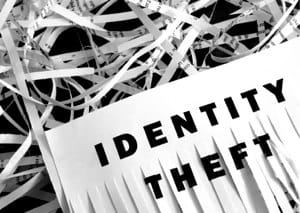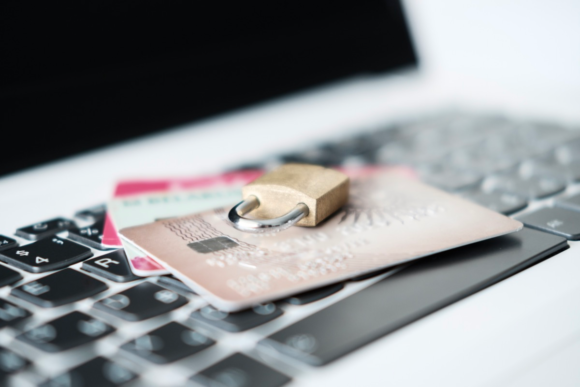Table of Contents
- The High Cost of Identity Theft
- How to Protect Yourself from Identity Theft
- Guard Your Private Information
- Minimize What You Carry in Your Wallet
- Review Your Account Statements
- Review Your Credit Reports
- Send and Receive Less Confidential Mail
- Shred Documents with Confidential Information
- Don’t Browse Confidential Sites in Public
- Use Complex Account Passwords
- Be Suspicious When Approached
- How to Protect Your Children’s Identity
- How you can protect your children’s identity
- Tell your children not to give out information unless it’s absolutely necessary
- Keep their Social Security Number (SSN) under wraps
- Run a credit report on each child from time to time
- Don’t talk to strangers!
- Order a credit freeze or extended fraud alert
- Actively Monitor Your Credit Profile
Whether or not you know it, you’re at risk of identity theft.
In 2013, a data breach at Yahoo compromised 3 billion accounts, according to the company. Facebook announced in 2019 that 540 million user records were exposed on the Amazon cloud server.
Data breaches and security hacks at major companies like these expose sensitive information, and they’re becoming more common.
It’s likely that you or someone you know has had their personal information exposed at least once.
Military members and veterans may be at greater risk because the Department of Defense and its contractors frequently used social security numbers to identify service members. The Department of Defense began relying on DOD Identification numbers more to mitigate the risk, but it’s hard to put the toothpaste back in the tube.
The High Cost of Identity Theft
Getting your credit card stolen is inconvenient, but your credit card company should protect you.
Having your debit card stolen is usually worse. Thieves can empty your bank account in a matter of days or hours – causing you to bounce checks or overdraft your account.
But having your identity stolen is the worst-case scenario. It can decimate your credit score, cause you legal issues and cost hours of your time to clean up the mess.
So what can you do?
How to Protect Yourself from Identity Theft
The rise of digital money management makes it easy to track your cash flow and budget from anywhere there’s an internet connection.
But, making the leap from paper to cyberspace can be dangerous.
While it’s impossible to protect yourself against every data breach, you can take some actions to limit your exposure.
Here are some tips to protect yourself.
Guard Your Private Information
Safeguard any documents that can be used to steal your identity, including your checks, Social Security card, birth certificates, marriage certificates, passports, military records and other personal documents.
Keep these under lock and key in a fireproof safe or safety deposit box.
Minimize What You Carry in Your Wallet
Never carry anything in your wallet that you don’t absolutely need. That includes your social security card and the miniature versions of your birth certificate or marriage certificate. That way, if you lose your wallet or it gets stolen, the thief won’t score every possible piece of your confidential information.
Review Your Account Statements
Review your bank and credit card statements weekly to make sure there aren’t any fraudulent charges.
Criminals will often slip in small charges that they hope you’ll miss.
Consider importing your bank and credit account transactions into an online or desktop financial software at least once a week. These programs can help you check amounts against your receipts and categorize them for your budget.
Review Your Credit Reports
Don’t forget to review your credit report from each of the three credit bureaus (Equifax, Experian and TransUnion) at least once per year. You can print or view your entire file at annualcreditreport.com.
If you can, space out your requests to pull a different report every four months to minimize the impact on your credit score.
Review your report carefully to make sure it is accurate and alll the listed accounts are yours.
Send and Receive Less Confidential Mail
Identity thieves love to steal confidential documents from your mailbox, and they don’t even have to live next door to do it.
Having a locking mailbox isn’t enough protection. Criminals can change your mailing address without your knowledge, sending your mail across the country. Stay a step ahead of thieves by going paperless. Opt-in to receive as many bills, account statements and confidential documents as you can via email or online account.
Visit OptOutPreScreen.com to have your name removed from direct marketing lists. Doing so will minimize your certain types of junk mail like preapproved credit card and insurance offers.
Shred Documents with Confidential Information

Shred anything and everything someone could use against you. This includes personal documents, old medical or financial statements and duplicate checks.
Since not every financial institution is on the paperless bandwagon yet, shred any document with confidential information that you don’t need.
Pre-approved credit card offers, bills and account statements can be used against you because they contain your name, address, account number and sometimes even your Social Security number. That’s all a thief needs to open an account in your name and run up a line of credit.
Don’t Browse Confidential Sites in Public
Never visit a confidential site, like your bank or investment accounts, from unsecured locations unless you have your own VPN service. Refrain from checking any important accounts at coffee shops, libraries or other places with a public internet connection.
Don’t check any of these accounts on a public computer either.
Use Complex Account Passwords
Never use simple passwords that a thief could guess, like your birthday, address or your child’s name. The best passwords are at least twelve characters and include a combination of letters, numbers and symbols. Change passwords for your financial accounts every few months to lock out any thieves who may have gained access.
Password examples:
- Terrible – Password
- Better (but still not great because it is close to a dictionary word) – P@$$wo3d
- Best – #Nilnq3@fe)(#%!@Fwv2
Be Suspicious When Approached
Be suspicious if you receive an email, letter or phone call from someone who says they’re from a government agency, bank, credit card company or any other financial institution.
Identity thieves will pose as trusted representatives so they can con you into giving up your confidential information. Always ask for their name, phone number or email so you can call them back. Then, do a web search to see if their story checks out.
If they drop the name of a legitimate agency or company, call the agency or company’s main line to verify that the person works there and there’s a legitimate need for them to contact you.
How to Protect Your Children’s Identity
Sadly, identity theft among children is a growing crime.
One of the biggest problems with identity theft with children is that it often goes undetected for years. Children don’t normally apply for credit, so there is little need to pull a credit report. And they don’t normally begin applying for jobs until they’re teenagers. Even if the teen does apply for a job, the fact that a bogus credit profile has been established by a thief usually will not be disclosed to the child by the employer who ran the report.
After years of successfully using a child’s identity, the thief may build up a complete financial profile, including credit, employment and even a residence. Upon coming of age, a child can learn that there is a substantial financial profile. Worse, not all of it may be good.
If the thief had poor credit or used the credit profile to bilk creditors, the child will start life with that information listed in the credit report. There may even be a record of unpaid liabilities.
How you can protect your children’s identity
It can actually be more difficult to protect your children’s identity than to protect your own. Since the child’s credit profile is inactive, and the child doesn’t necessarily know when not to disclose personal information, it can be close to impossible to know when their identity has been compromised. But there are steps you can take to minimize the potential theft.
Tell your children not to give out information unless it’s absolutely necessary
This can be tougher to manage than it sounds on the surface. Children – especially young ones – tend to be very trusting of other people, especially adults. But you should try to emphasize to them that they should never give out too much information to anyone. For example, if anyone asks for any more than their name and address, you can train them to simply say “I don’t know.” The less information that they give out, the better protected they’ll be.
Keep their Social Security Number (SSN) under wraps
It used to be that to get a Social Security number you had to specifically apply for it, which usually happened when a child was a teenager. Today, Social Security numbers are issued at birth, which is to say that everyone has one whether they want one or not. And today, it seems as if everyone wants your Social Security number as a matter of course.
The best protection here is not to provide your child with his or her Social Security card, and not to allow them to memorize the number. The combination of their name and Social Security number is an easy target for a would-be thief. Your child most likely won’t need to know his or her Social Security number until he or she applies for a job; until then, keep it under lock and key.
Run a credit report on each child from time to time
Generally, the best way to know if a child’s identity has been stolen is to run a credit report. This isn’t to say that you need to monitor your child’s credit report on an ongoing basis. But ordering a report every year or two will let you know if a theft has occurred. If there is any information on the report – other than what you know to exist – there’s a strong likelihood of theft. But you’ll only know that if you run a credit report on your children every now and again.
Don’t talk to strangers!
This is probably the oldest warning in existence given to children, but it applies to identity theft as well. In addition to physical safety concerns, children should avoid talking to anyone they don’t know particularly if that person is requesting information that could identify them. There should be no reason to give a stranger any information, including your name.
Order a credit freeze or extended fraud alert
If your child’s identity has been stolen, you should proceed in the same way you would for yourself. You should order either a credit freeze or extended fraud alert to the credit repositories (Trans Union, Experian and Equifax), and then file a report with the police. The freeze or fraud alert will prevent further use of your child’s identity, while the police report will launch a criminal investigation.
If you are worried about identity theft for yourself, you should be equally worried about it happening to your children. Thieves are looking to steal identities for all kinds of reasons that make absolutely no sense to the rest of us. That means we have to be on guard all the time, and even more so for our children.
Actively Monitor Your Credit Profile
Monitoring your credit profile is the most proactive way to protect yourself. Each of the three major credit bureaus will give you a free credit report once a year. You can stagger these and get one report every four months.
If you want to take things a step further, sign up for active monitoring and identity theft insurance. These services usually come with a monthly or annual fee, but they include active monitoring and insurance that will cover the cost of fraudulent charges.
Note: If you believe you have been the victim of a cybercrime or just want to learn more, visit the Federal Trade Commission website.
The government-sponsored site, OnGuardOnline.gov, also gives useful tips about securing your computer and your personal information.




Comments:
About the comments on this site:
These responses are not provided or commissioned by the bank advertiser. Responses have not been reviewed, approved or otherwise endorsed by the bank advertiser. It is not the bank advertiser’s responsibility to ensure all posts and/or questions are answered.
WILLIAM RUNGE says
Life Lock is B.S. Being fined by Gov. They do not do anything they say n!!!!
robert says
Sponsor ID? Since enrolling in Tricare speciality medicine home delivery service, the first item you must divulge is your sponsor ID number,aka SSN. I believe we can do better to enhance this procedure. Perhaps a unique identifier or some other means would be more appropriate.
Ryan Guina says
Robert, I agree. The VA requires the same thing. A SSN is required by most official government agencies. It’s unfortunate, and in my opinion, presents an unnecessary risk to those who are required to frequently give out their SSN.
Roger says
The military really needs to go back to using a less sensitive way of identifying soldiers. Requiring a social security number to eat at the chow hall is just begging for abuse. Identity theft of servicemen & women has been on the rise in recent years as many are deployed overseas, it’s difficult for them to watch over their credit as diligently. ID thieves can do an enormous amount of damage before the victim has the opportunity to detect that it’s happened.
Adam says
I’ll say this though, i was shocked when i got out of the military, i didn’t even realize a ssn was so sensitive, i used it so much on everything, said it around people, signed every document with it. it was odd to NOT use my ssn with everything
Ryan says
Robert, I am not sure when they changed it. The military doesn’t require the use of full SSN on bags, clothing, or other items that can be seen by everyone. They usually require the last initial and the last four digits of the SSN, or a similar mark. For most documents though, the full SSN is required. And the paperwork never ends!
Robert Childress says
Hello, I was in the military back in the late sixties, and we were still using the serial number that we had to memorize. I’m not sure when they changed it over, but they did at one time have a unique number way back then.